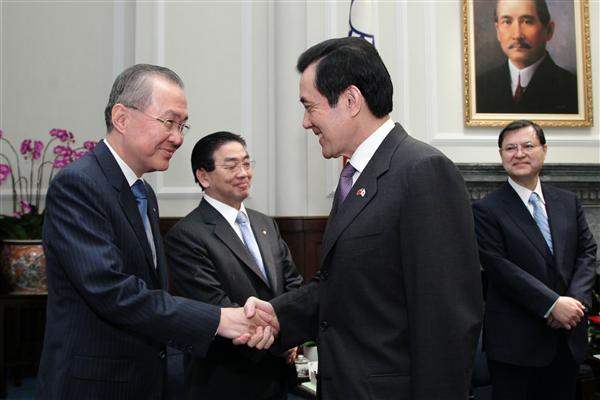News & activities
 News releases
News releases
President Ma Ying-jeou met on the morning of June 4 with Hiromasa Ikeda, Vice President of the Japanese lay Buddhist organization Soka Gakkai International (SGI). The president recognized the contributions of the organization in public welfare and disaster relief. He also reiterated that the current close state of relations between the ROC and Japan is unprecedented in the last 40 years.
In remarks, the president said that when he served as Taipei City mayor in 2003, he issued a certificate to SGI President Daisaku Ikeda that named him as an honorary citizen of Taipei. At the time, the president said, Vice President Hiromasa Ikeda came to Taiwan to accept the honor on President Ikeda's behalf. The president expressed his delight at having the opportunity to meet again with Vice President Ikeda after nine years. And President Ma expressed his deepest congratulations to President Daisaku Ikeda for his being named a professor emeritus by National Taiwan Normal University.
President Ma stated that Soka Gakkai has long been involved in the areas of public welfare, education, and religious teaching. He pointed out that Taiwan Soka Association has received the National Outstanding Social Organization Award for 16 consecutive years from the Ministry of the Interior. Meanwhile, it has been singled out eight times by the Ministry of Education for its Award for Contribution to Social Education and nine times by the Ministry of the Interior for its Outstanding Religious Organization Award. The president applauded the organization's outstanding achievements. In addition, he stated that it has provided assistance in disaster rescue and relief work here in the past, including the September 21, 1999 earthquake and the mudslides and flooding caused by Typhoon Morakot in portions of southern and eastern Taiwan in 2009. The people of Taiwan are deeply grateful for the efforts made on their behalf, he said.
President Ma stressed that the people of Taiwan remembered this generosity when they enthusiastically extended a helping hand to Japan after the Great East Japan Earthquake of March 11, 2011. The mutual assistance and interaction between the people of the two countries has created even closer friendship between the two sides, and the people of Japan speak of a "deep bond of friendship"—"kizuna" in Japanese—between the two countries. Bearing this in mind, the president said that upon taking office in 2008 he immediately designated the relationship between Taiwan and Japan as a special partnership. President Ma said the following year was named "The Year to Foster the Special Partnership between Taiwan and Japan." These developments highlight the new level of relations between the two countries, he noted.
The president remarked that even though Taiwan and Japan do not maintain formal diplomatic ties, substantive relations between the two are extremely close. For instance, Japan is Taiwan's second largest trading partner, while Taiwan is Japan's fourth largest trading partner. At the same time, each constitutes the second largest source of tourists for the other, he said. Besides this, Taiwan and Japan have signed a number of agreements since 2009, including a youth working holiday agreement, the Taiwan-Japan Bilateral Investment Arrangement, and an open skies accord. Other breakthroughs in ties, the president said, include the opening of a representative office by Taiwan in Sapporo, Japan's amendment of regulations to show the country of origin on the residency permits of ROC nationals residing in Japan as "Taiwan," and the commencement of direct flights between Taipei's Songshan Airport and Tokyo's Haneda Airport.
President Ma furthermore explained that the Yoichi Hatta Memorial Park, which was built to commemorate the Japanese hydraulic engineer's contributions to southern Taiwan's irrigation system, was completed and inaugurated last year. The ROC, the president said, seeks to look at history impartially and distinguish between the good and bad events that previously took place here. Therefore, it desires to recognize the contributions of the Japanese in aiding Taiwan's development, he noted. Meanwhile, the Japanese parliament (Diet) has also passed the Law Concerning Promotion of Exhibitions of Art Objects from Overseas, which provides protection to works of art from overseas that are being displayed in Japan. This legislation, the president pointed out, has eliminated a barrier to Taiwan's National Palace Museum holding an exhibition of selected pieces in Japan in the future. It is expected that an exhibition will be held in 2014, he added, which he furthermore said will create a new milestone in the history of Asian cultural exchanges. This also demonstrates the unprecedented state of ties between the two countries since they severed diplomatic relations 40 years ago in 1972, he said.
In addition to Vice President Ikeda, the delegation also included the SGI director of international relations Keiichi Kakurai as well as Taiwan Soka Association General Director Lin Chao (林釗) and CEO Lin Ting-feng (林廷鋒). The delegation was accompanied to the Presidential Office by Association of East Asian Relations Chairman Liao Liou-yi (廖了以) to meet President Ma. Also attending the meeting were National Security Council Advisor Lee Chia-chin (李嘉進) and Vice Minister of Foreign Affairs Simon Shen-Yeaw Ko (柯森耀).



